Real World 101
Professionals bring skills and networks to the classroom as adjuncts
After returning from a business trip to China, Montclair State adjunct professor Te Wu, a project executive who works all over the world, showed his class a photo of a 12-lane “ordinary” roadway in Beijing, jammed with traffic. “This is what you have to compete against in the global village,” Wu told his students. “A simple photo shows the magnitude of competition ahead of us.”
Wu often shares his experiences from the field with his students and is just one of many professionals who bring their skills to the classroom as adjunct professors.
"Think of a career as a ladder. After you graduate, you grab the first rung and then climb up."
- Te Wu
Montclair State University’s proximity to New York City not only helps the University attract highly regarded academics and researchers, it also draws professionals who want to give back by teaching --- giving students a glimpse into the working world while often providing them an edge in the job market after graduation.
Wu, a management consultant for 20 years, has taught at Montclair State’s School of Business since 2003. As one of fewer than 1,000 certified program and project management professionals (PgMP/PMP) worldwide, he brings extensive business experience to the classroom.
“I think the biggest influence is the bridging effect --- bridging current business trends, practical real-world needs and the challenges in the current business environment with academic theories,” says Wu, who is also working on his PhD dissertation on project management.
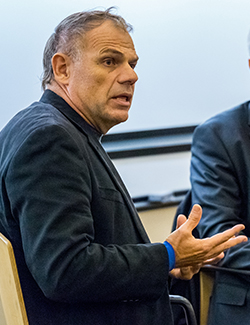
Mo Sacirbey

Te Wu
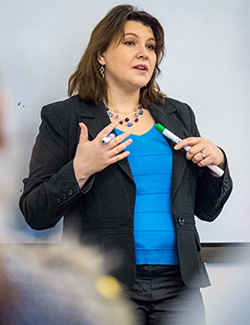
Melanie Croce-Galis
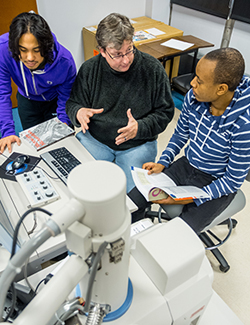
Michael T. Ganger
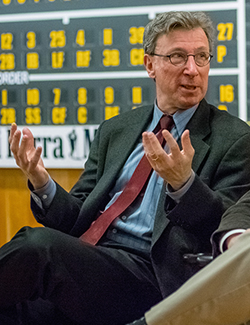
Harvey Araton
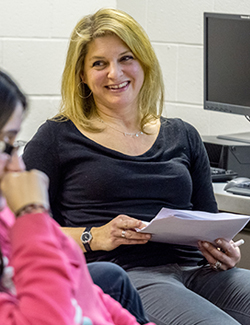
Jacqueline Mroz
Wu has built a management consulting firm specializing in “strategic business execution” with a social mission of “nurturing tomorrow’s business professionals” by offering students internships and apprenticeships at his consulting firm.
“Since 2007, the year of the Great Recession, entry-level professional jobs are becoming scarcer,” he says. “Think of a career as a ladder. After you graduate, you grab the first rung and then climb up. Now imagine that first rung is removed or greatly weakened. That’s what’s happening in this country.”
Diplomacy at work
Professor Muhamed “Mo” Sacirbey, an adjunct instructor in the School of
Communication and Media, has worked in international relations, law and business.
A former Bosnian foreign minister and United Nations ambassador for Bosnia-Herzegovina, he now is a frequent television news commentator and teaches a course on digital diplomacy and new media. Sacirbey says social media and other new media are changing how ordinary citizens interact with intergovernmental institutions like the United Nations.
“Most of those at the U.N. are not diplomats, they’re people doing all sorts of tasks and, increasingly, each one of them is connected to an outreach program” that requires people with new media skills --- like students --- to function, Sacirbey says.
Sacirbey keeps up on the latest trends in the world’s media and in diplomatic circles. “I try to introduce students to practical opportunities,” Sacirbey says. “A student can go from the classroom to an internship to a real, paying job.”
Sacirbey takes his students to the United Nations headquarters in New York City to introduce them to people in non-governmental organizations (NGOs) and media institutions because they like to hire students. “This is something that can very quickly pay off in students’ careers,” Sacirbey notes.
Making beautiful music
Professor Anthony Mazzocchi, an adjunct trombone professor and interim associate director of the John J. Cali School of Music, was a professional trombonist for most of his early career, performing with the Los Angeles Philharmonic, New Jersey Symphony and San Diego Symphony as well as on movie soundtracks and Broadway.
Mazzocchi began teaching at a middle school in 2001 in Brooklyn, N.Y. Although hesitant at first, he quickly discovered the vast potential of young musicians and went on to create a nationally recognized music program. For his efforts in improving music education, Mazzocchi became one of 25 semifinalist nominees for the Grammy
Foundation’s first-ever Music Educator Award in 2013. “When I started teaching I had a low expectation of kids,” Mazzocchi says. “But what I found is that they are capable of doing everything a professional can do, if they’re taught the right way.”
Mazzocchi has helped many students get into graduate programs and has helped others find freelance work in New York City.
While it may not happen quickly, it’s important to hold students to the same standards as professionals, he says. “You’ll always be striving towards it, and that’s a beautiful thing to teach.”
Thinking globally
Registered nurse Melanie Croce-Galis has taught in the College of Education and Human Services Health and Nutrition Sciences department since 2009. She holds a Master of Public Health degree from New York University with a specialization in international community health. Croce-Galis’ work outside Montclair State focuses on women’s reproductive health, including HIV/AIDS prevention programming. She spent several years working with governments and NGOs across sub-Saharan Africa to translate sexual and reproductive research into effective public health programs for women and girls.
She is the co-founder and executive director of the What Works Association, a nonprofit organization working to transform the lives of women and girls by improving programs worldwide that serve them. Croce-Galis and the What Works Association provide technical assistance to create programs that take gender norms into account and to identify successful evidence-based programming that is most responsive to women’s needs. The United States President’s Emergency Plan for AIDS Relief, UNAIDS and the Global Fund to Fight AIDS, Tuberculosis and Malaria have highlighted her work and that of the association as a critical resource in creating gender-responsive programming. In turn, she is able to use this work in her classroom.
“We tend to think very insularly in the U.S. We don’t really think beyond our borders,” Croce-Galis says. In her Montclair State course on the study of human disease, Croce-Galis introduces her students to a wider, global perspective “because health transcends borders.”
Her work has had a strong influence on her teaching. Croce-Galis translates the study of human disease into a practical, global perspective on health that widens students’ understanding of public health and disease transmission. “That’s what I really love to do --- take something and really make it useful for people, to move it from the theoretical to the practical.”
In the news
Before teaching at Montclair State, Jacqueline Mroz’s career in print and radio journalism
took her to other countries. Her career began at a paper in Boston, then took her to Argentina, where she worked for the Buenos Aires Herald and Reuters and later took her to England, where she worked for the BBC World Service. Later, she relocated to
New Jersey and worked as an assignment editor and later an editorial writer at The Record in Bergen County. She now freelances for The New York Times and New Jersey Monthly and is working on a book based on an article she wrote for The New York Times.
Aside from the basics of writing and editing, Mroz teaches students about the industry. “It’s important for students to know how the field works,” she says.
With contacts in the field, she brings in guest speakers from The New York Times and other media organizations. “It’s great for students to hear from people working in the field now,” Mroz says.
Her students must interview professional editors because it gives them a sense of what the job entails and can provide opportunities. “It’s been great for students because many of them are offered freelance work or jobs just through doing that,” she says.
"I love being able to impart the things that I've learned over time through trial and error to students."
- Michael T. Ganger
Real-life examples
Michael T. Ganger, who teaches in the College of Science and Mathematics
Department of Biology and Molecular Biology, is an expert in electron microscopy. He received both an undergraduate and graduate degree from Montclair State and is now a laboratory manager and an electron microscopist at Weill Cornell Medical College’s Department of Surgical Pathology. At his lab job, Ganger primarily does diagnostic work with kidney tissue for a renal pathologist, and he uses some of that work in the classroom.
“I bring a lot of real-life examples in the classroom --- it’s a very interactive class,” Ganger says. Exams are often structured with scenarios from his own lab. “A researcher will sometimes just drop something in front of me and say, ‘Go look at this,’” he says. He simulates that type of real-world problem solving in his class.
Ganger also invites students to visit his lab at Weill Cornell Medical College to observe how a professional laboratory works. “I let them do things in the lab they don’t necessarily get a chance to do in the classroom,” says Ganger. “It’s a real eye-opener for them to come to the lab. I love being able to impart the things that I’ve learned over time through trial and error to students.”
The wide world of sports
Harvey Araton, who teaches in the English department, has been a sports reporter and columnist for The New York Times since 1991. He has also written for the Sunday Real Estate, Home, Dining and Culture sections of the Times. In addition, Araton has written several books, including the best selling Driving Mr. Yogi: Yogi Berra, Ron Guidry, and Baseball’s Greatest Gift.
Like Mroz, Araton invites distinguished media guest speakers to his classes, where they often connect with students. He also assigns students to follow a specific journalist’s work throughout the semester so that they can better understand from where the news is coming.
“Today, there’s so much thrown at these young people from so many different sources,” says Araton. “The news comes to you as opposed to you going to it. It’s harder for young people to distinguish where they’re really getting their news from.”
“You don’t need a substantial pedigree to make a mark in this field, it’s based on your aggressiveness, curiosity and willingness to put yourself in uncomfortable situations,” Araton says, noting it took a lot of perseverance to get where he is today. “I try to pass that along to my students. There’s opportunity if they hustle.”
